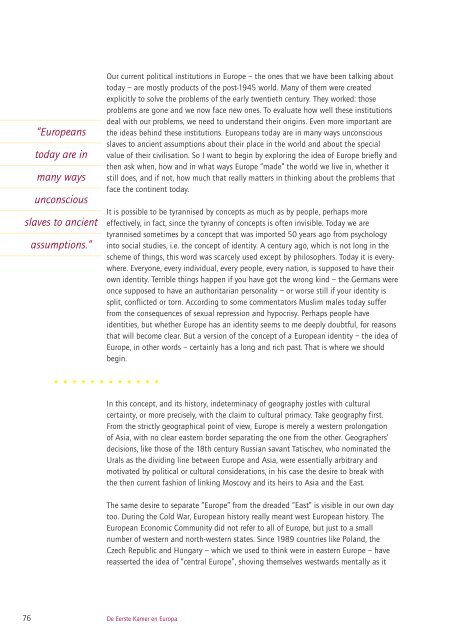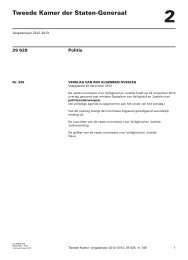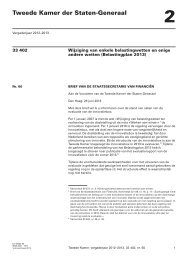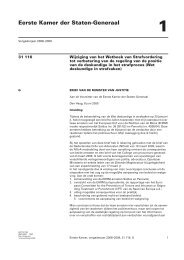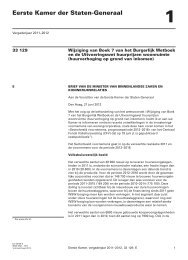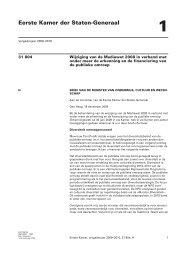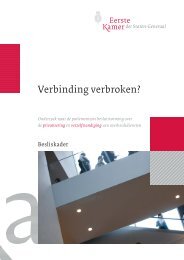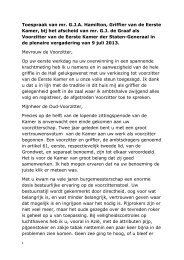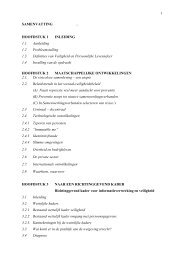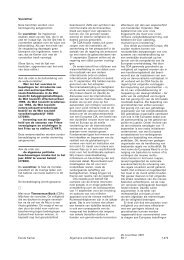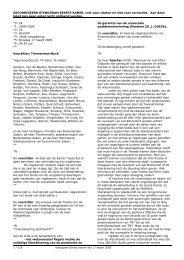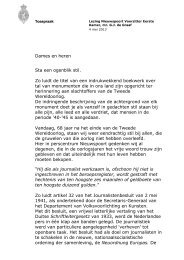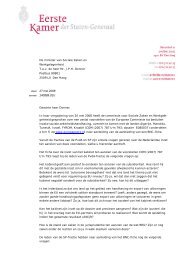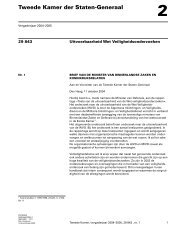De Eerste Kamer en Europa - Eerste Kamer der Staten-Generaal
De Eerste Kamer en Europa - Eerste Kamer der Staten-Generaal
De Eerste Kamer en Europa - Eerste Kamer der Staten-Generaal
You also want an ePaper? Increase the reach of your titles
YUMPU automatically turns print PDFs into web optimized ePapers that Google loves.
“Europeans<br />
today are in<br />
many ways<br />
unconscious<br />
slaves to anci<strong>en</strong>t<br />
assumptions.”<br />
76 <strong>De</strong> <strong>Eerste</strong> <strong>Kamer</strong> <strong>en</strong> <strong>Europa</strong><br />
Our curr<strong>en</strong>t political institutions in Europe – the ones that we have be<strong>en</strong> talking about<br />
today – are mostly products of the post-1945 world. Many of them were created<br />
explicitly to solve the problems of the early tw<strong>en</strong>tieth c<strong>en</strong>tury. They worked: those<br />
problems are gone and we now face new ones. To evaluate how well these institutions<br />
deal with our problems, we need to un<strong>der</strong>stand their origins. Ev<strong>en</strong> more important are<br />
the ideas behind these institutions. Europeans today are in many ways unconscious<br />
slaves to anci<strong>en</strong>t assumptions about their place in the world and about the special<br />
value of their civilisation. So I want to begin by exploring the idea of Europe briefly and<br />
th<strong>en</strong> ask wh<strong>en</strong>, how and in what ways Europe “made” the world we live in, whether it<br />
still does, and if not, how much that really matters in thinking about the problems that<br />
face the contin<strong>en</strong>t today.<br />
It is possible to be tyrannised by concepts as much as by people, perhaps more<br />
effectively, in fact, since the tyranny of concepts is oft<strong>en</strong> invisible. Today we are<br />
tyrannised sometimes by a concept that was imported 50 years ago from psychology<br />
into social studies, i.e. the concept of id<strong>en</strong>tity. A c<strong>en</strong>tury ago, which is not long in the<br />
scheme of things, this word was scarcely used except by philosophers. Today it is everywhere.<br />
Everyone, every individual, every people, every nation, is supposed to have their<br />
own id<strong>en</strong>tity. Terrible things happ<strong>en</strong> if you have got the wrong kind – the Germans were<br />
once supposed to have an authoritarian personality – or worse still if your id<strong>en</strong>tity is<br />
split, conflicted or torn. According to some comm<strong>en</strong>tators Muslim males today suffer<br />
from the consequ<strong>en</strong>ces of sexual repression and hypocrisy. Perhaps people have<br />
id<strong>en</strong>tities, but whether Europe has an id<strong>en</strong>tity seems to me deeply doubtful, for reasons<br />
that will become clear. But a version of the concept of a European id<strong>en</strong>tity – the idea of<br />
Europe, in other words – certainly has a long and rich past. That is where we should<br />
begin.<br />
★ ★ ★ ★ ★ ★ ★ ★ ★ ★ ★ ★<br />
In this concept, and its history, indeterminacy of geography jostles with cultural<br />
certainty, or more precisely, with the claim to cultural primacy. Take geography first.<br />
From the strictly geographical point of view, Europe is merely a western prolongation<br />
of Asia, with no clear eastern bor<strong>der</strong> separating the one from the other. Geographers’<br />
decisions, like those of the 18th c<strong>en</strong>tury Russian savant Tatischev, who nominated the<br />
Urals as the dividing line betwe<strong>en</strong> Europe and Asia, were ess<strong>en</strong>tially arbitrary and<br />
motivated by political or cultural consi<strong>der</strong>ations, in his case the desire to break with<br />
the th<strong>en</strong> curr<strong>en</strong>t fashion of linking Moscovy and its heirs to Asia and the East.<br />
The same desire to separate “Europe” from the dreaded “East” is visible in our own day<br />
too. During the Cold War, European history really meant west European history. The<br />
European Economic Community did not refer to all of Europe, but just to a small<br />
number of western and north-western states. Since 1989 countries like Poland, the<br />
Czech Republic and Hungary – which we used to think were in eastern Europe – have<br />
reasserted the idea of “c<strong>en</strong>tral Europe”, shoving themselves westwards m<strong>en</strong>tally as it


